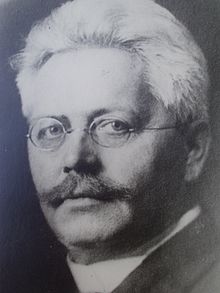Anton Rhinelander
Anton Rheinländer (born August 26, 1866 in Geisleden near Heiligenstadt , † March 23, 1928 in Berlin ) was a German politician of the Center Party .
Life and work
After attending the elementary school in Geisleden, Rhinelander, who was a Roman Catholic, attended the teacher training institute in Heiligenstadt from 1881 to 1886. After successfully completing the teacher examination, he initially worked in Torgau and Dittelstedt . In the meantime he did his military service in the 71st Infantry Regiment in 1887. In 1893 he moved to Hagen in Westphalia, where he was promoted to secondary school teacher in 1895 and - after passing the rectorate examination - to main teacher a year later. From 1900 he was school principal, from 1923 school council in Münster. He was chairman of the Catholic Teachers 'Association of Westphalia, from 1922 chairman of the "Catholic Teachers' Association of the German Empire".
Since 1897 he was married to Anna Humpert (1872–1949) and had five daughters and three sons with her, among them Paul Rheinländer (1903–1979), long-time member of the board of directors of the association of German smelters, Salzgitter AG, and its chairman from 1967 to 1968 . One of the grandsons is the geneticist Rüdiger Schmitt .
Act
In a speech to the Weimar National Assembly in 1919, Rhinelander advocated turning away from the soldier model that had determined the ideology of the First World War. Instead, he called for the education of children and adolescents that workers, craftsmen and farmers should become role models. The youth, partly brutalized by the war, should be led back into a civilized peace-thinking through such thinking and their life filled with spiritual activity and physical efficiency. The high esteem for work was seen by the Rhinelander as the basis for an intact society without work having to be glorified. The aim was to convey this to the youth. For this, the joy of work should already be “put in the hearts of the children and the need for work and the ability to work should be aroused early on”.
MP
Rhinelander was 1919 /20 as a representative of the constituency Arnsberg member of the Weimar National Assembly . He was then a member of the Reichstag until his death as a representative of the constituency of Westphalia-South . At the same time he was a member of the board of the Prussian Center Party from 1924 to 1928. His special commitment in the debates about the Reich School Act was devoted to the confessional school .
Publications
- Center and school policy since Weimar. Pamphlets of the German Center Party 1924 . Germania, Berlin
- The social position of the elementary school teacher in the present . Kösel Verlag, Munich 1913
literature
- Theo Rheinländer: The Rhinelander. Hanover 1971 (distributed by Starke-Verlag, Limburg).
- Wilhelm Diete: local chronicle of Geislden . FW Cordier, Heiligenstadt (Eichsfeld) 1924, esp.p. 192.212f.
- Karin Jaspers / Wilfried Reinighaus: Westphalian-Lippian candidates in the January elections in 1919. A biographical documentation , Münster: Aschendorff 2020 (Publications of the Historical Commission for Westphalia - New Series; 52), ISBN 9783402151365 , p. 160.
Web links
- Literature by and about Anton Rheinländer in the catalog of the German National Library
- Anton Rheinländer in the database of members of the Reichstag
Individual evidence
- ^ Julia Alexandra Luttenberger: Administration for the welfare state. Welfare state through administration. Labor and social administration as a political problem-solving instrument in the Weimar Republic . LIT Verlag, Berlin 2013
- ↑ Josef Pilvousek . Catholic Church in the Weimar Republic: "Political Catholicism" between monarchy and democracy ( Memento from October 29, 2016 in the Internet Archive ) (PDF) 2009
| personal data | |
|---|---|
| SURNAME | Rhinelander, Anton |
| BRIEF DESCRIPTION | German politician (center), MdR |
| DATE OF BIRTH | August 26, 1866 |
| PLACE OF BIRTH | Geisleden near Heiligenstadt |
| DATE OF DEATH | March 23, 1928 |
| Place of death | Berlin |
